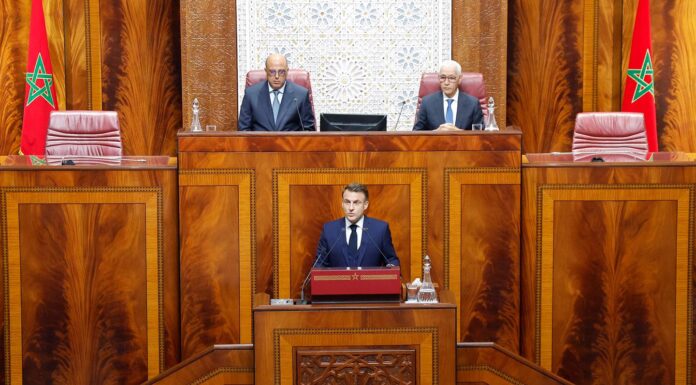The uncertain future of EU-US relations under a second Donald Trump presidency will be one of the main issues when European leaders meet in Budapest.
A large contingency of European leaders, including most members of the European Union, have descended onto Budapest for a high-level meeting that is set to be dominated by one burning question: How do we deal with Donald Trump?
From Brussels to Warsaw, capitals are still processing the Republican’s surprisingly strong victory and wondering what his second US presidency might mean for the continent’s immediate future, already under duress by multiple challenges at home.
Among his campaign promises, Trump has floated a plan to impose across-the-board tariffs on all foreign-made products coming into the United States, which, if enacted, could wreak untold havoc on Europe’s export-reliant economy. His hardline policy against China might force Beijing to redirect its trade flows to the continent and bring in a new flood of cheap goods that further upend market competition.
The billionaire is also expected to promote domestic fossil fuel industries, pull out (again) of the Paris Agreement and hamper global efforts to mitigate climate change.
But for European leaders, Ukraine and NATO will be top-of-the-mind.
Trump has openly threatened to revise, or even cut off, Washington’s financial and military assistance to the war-torn country and bragged he would “encourage” Russia to do “whatever the hell they want” with NATO members that fail to meet spending targets. His promise to strike a deal to end the war in “24 hours” is stoking fears that he could impose painful territorial concessions on Kyiv to Moscow’s benefit.
Throughout his first term, Trump adopted a markedly transactional approach to foreign policy, treating diplomacy as a negotiation based on a return-of-investment mindset rather than on long-cherished principles. The approach proved particularly problematic for the EU, a supranational entity that relies heavily on the rules-based multilateral system to advance its interests. The collapse of the World Trade Organization’s settlement dispute bears witness to his disruption.
“We’re prepared for any bumps that might appear, it’s not our first rodeo,” a senior diplomat said, speaking on condition of anonymity. “We will do that, as we always do with America, in the spirit of dialogue but also of strength.”
In anticipation of the US elections, the European Commission established a dedicated task force to prepare for possible scenarios, reflecting how high the stakes have become for the bloc. Still, Trump’s inherent unpredictability makes it difficult, not to say impossible, for any country or institution to plan ahead.
The EU is “ready to face the challenges of the world and defend its values, with all its partners and allies. And that remains, whatever the outcome of the elections here or there can be,” insisted another diplomat.
Orbán’s surprise guest?
All these thorny issues, together with migration management, the economy and security, will be discussed at length across several meetings that will begin on Thursday morning in Budapest and stretch into Friday afternoon.
First up will be the bi-annual European Political Community (EPC), an enlarged format created in the aftermath of Russia’s invasion of Ukraine that gathers leaders from across the continent, including Ukraine, Moldova, the UK, Turkey and the Western Balkans.
It’s unclear how many heads of government and state will show up. Previous editions of the EPC grouped a little over 40 leaders. Among the absentees will be Spain’s Prime Minister Pedro Sánchez, who has chosen to stay home to coordinate the response to the devastating flash floods in the Valencia region.
Ireland, Slovenia and Iceland are not expected to participate either.
Volodymyr Zelenskyy, meanwhile, is likely to attend and plea with allies for more weapons and financial aid to advance his “Victory Plan.” The request could acquire a special urgency in the wake of Trump’s victory, even if the meeting’s host, Hungarian Prime Minister Viktor Orbán, has dismissed this military assistance as a “pro-war agenda”.
Following the EPC, Orbán will host a dinner for the EU leaders present in Budapest that will focus on the future of EU-US relations and the situation in Georgia.
Orbán has made no secret of his admiration for Trump and believes his political comeback could help vindicate Hungary’s often-antagonist position in Brussels.
“We trusted that by the end of the year, in the Western world, those who are pro-peace are a majority and that we will defeat those who are pro-war,” Orbán said in a video message posted shortly after Trump’s victory became clear.
“There is a huge chance that now, and if it happens like this, the economy can be repaired and Hungarian-American relations can go back to their golden age,” he added.
Officials acknowledge the risk that Orbán might invite Trump to join the dinner via remote connection, a last-minute surprise that could spark a backlash in the room. Although some lime-minded leaders, such as Slovakia’s Robert Fico or Italy’s Giorgia Meloni, might welcome a chance to greet America’s 47th president.
On Friday, EU leaders will get together for an informal summit that will produce a “New European Competitiveness Deal” based on the recommendations issued by Mario Draghi in his landmark report. Draghi, alongside European Central Bank President Christine Lagarde, will take part in the summit.










